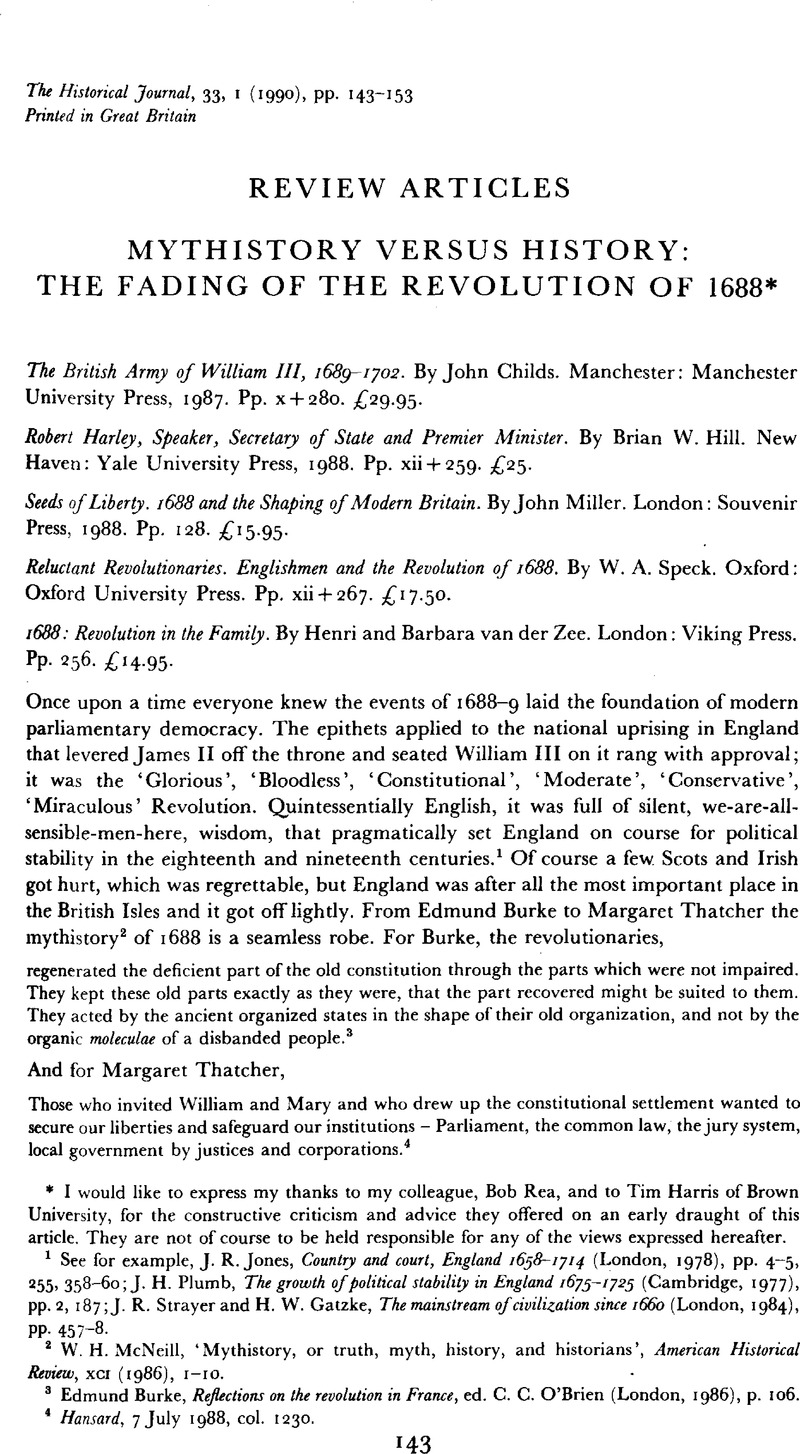Article contents
Mythistory Versus History: the Fading of the Revolution of 1688*
Published online by Cambridge University Press: 11 February 2009
Abstract

- Type
- Review Articles
- Information
- Copyright
- Copyright © Cambridge University Press 1990
References
1 See for example, Jones, J. R., Country and court, England 1658–1714 (London, 1978), pp. 4–5Google Scholar, 255, 358–60; Plumb, J. H., The growth of political stability in England 1675–1725 (Cambridge, 1977), pp. 2Google Scholar, 187; Strayer, J. R. and Gatzke, H. W., The mainstream of civilization since 1660 (London, 1984), PP. 457–8Google Scholar.
2 McNeill, W. H., ‘Mythistory, or truth, myth, history, and historians’, American Historical Review, XCI (1986), 1–10CrossRefGoogle Scholar.
3 Burke, Edmund, Reflections on the revolution in France, ed. O'Brien, C. C. (London, 1986), p. 106Google Scholar.
4 Hansard, 7 July 1988, col. 1230.
5 Ibid. col. 1231–4, 1235.
6 Ibid. col. 1232–3, speech by Neil Kinnock citing Christopher Hill; Speck, , Reluctant revolutionaries, pp. 21Google Scholar, 241–2.
7 Paper given by Professor Pocock at the outset of the Browning Lectures on 1688 to be published), autumn 1988.
8 Speck, , Reluctant revolutionaries, p. 4Google Scholar.
9 Ibid. p. 141.
10 According to J. W. Croker, in 1828 George Ill's daughter Augusta remarked to a friend, ‘I was ashamed to hear myself called Princess Augusta, and never could persuade myself that I was so, as long as any of the Stuart family were alive; but after the death of Cardinal York, I felt myself to be really Princess Augusta’ Cited in, Clark, J. C. D., English society 1688–1832 (Cambridge, 1985), p. 161Google Scholar.
11 Speck, , Reluctant revolutionaries, p. 236Google Scholar.
12 Miller, , Seeds of liberty, p. 35Google Scholar.
13 Of the seven, the earls of Devonshire and Shrewsbury, Henry Sidney and Edward Russell were clear-cut whigs by 1688. Lord Lumley's whig credentials have been questioned in the light of his catholic origins and active service against Monmouth in 1685 (Feiling, K. G., A history of the Tory Party 1640–1714 (Oxford, 1950), p. 224)Google Scholar. Such doubts are probably misplaced. Lumley appears to have undergone a political conversion between 1686, when he lost his regiment for giving the wrong answers during the ‘closeting’ campaign, and 1688, when he signed the invitation to William (Childs, J., The army, James IIand the Glorious Revolution (Manchester, 1980), pp. 47–8)Google Scholar, because after the revolution the only recorded occasions on which he voted against the whig party line were on anti-Nonconformist issues (Holmes, G., British politics in the age of Anne (2nd edn, London, 1987), pp. 227Google Scholar, 432; Horwitz, H., Parliament policy and politics in the reign of William III (Manchester, 1977), p. 336)Google Scholar. His Anglicanism, it appears, was so devout that he shared the tones' hatred of religious dissent.
14 Miller, , Seeds of liberty, p. 58Google Scholar.
15 Ibid. pp. 68, 103.
16 Ibid. p. 106.
17 Ferguson, W., Scotland's relations with England: a survey to lyoy (Edinburgh, 1977), pp. 246–52Google Scholar.
18 Zees, Van der, Revolution in the family, pp. 19–20Google Scholar.
19 Collinson, P., ‘A chosen people? The English church and the reformation’, History Today, XXXVI (1986), 9–14Google Scholar; Fletcher, A., ‘The first century of English protestantism and the growth of national identity’, in, Mews, S. (ed.), Religion and national identity, studies in church history, XVIII (Oxford, 1982)Google Scholar.
20 Zees, Van der, Revolution in the family, pp. 23Google Scholar, 54.
21 Recent works dealing with Monmouth's rebellion and Churchill's part in its suppression include: Earle, P., Monmouth's rebels. The road to Sedgemoor 1685 (London, 1977)Google Scholar; Clifton, R., The last popular rebellion. The western rising of 1685 (London, 1984)Google Scholar; Chandler, D., Marlborough as military commander (2nd edn, London, 1979), pp. 14–21Google Scholar.
22 Zees, Van der, Revolution in the family, p. 54Google Scholar.
23 Ibid. p. 50.
24 Ibid. p. 57.
25 Gregg, E., Queen Anne (1980), pp. 43–5Google Scholar.
26 Zees, Van der, Revolution in the family, pp. 241Google Scholar,242.
27 Childs, , British army of William III, viGoogle Scholar.
28 Ibid. p. 173.
29 Cf. McInnes, A., Robert Harley, Puritan politician (1969)Google Scholar.
30 Hill, , Robert Harley, pp. XGoogle Scholar, 133–222 passim, 238.
31 Cf. Black, J., British foreign policy in the age of Walpole (Edinburgh, 1985)Google Scholar; McInnes, , Robert Harley, pp. 189–92Google Scholar; Szechi, D., Jacobitism and tory politics 1710–14 (Edinburgh, 1984)Google Scholar.
32 Hayton, D., ‘The “country ” interest and the party system’, in, Jones, C. (ed.), Party and management in parliament, 1660–1784 (Leicester, 1984), p. 65Google Scholar.
33 Szechi, , Jacobitism and tory politics, pp. 190–1Google Scholar.
- 3
- Cited by


